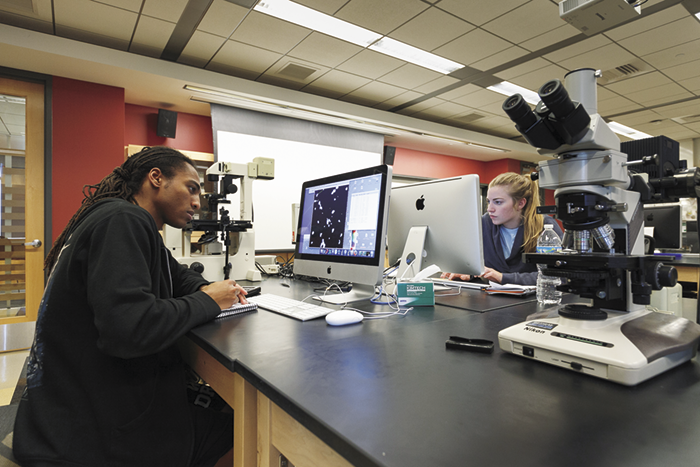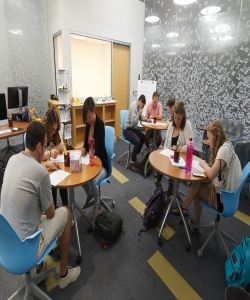Overview
Access and Disability Services (ADS) facilitates access and reasonable accommodations for eligible students with disabilities and serves as a support and resource for faculty and administrators. Dickinson's accommodation policies and practices are in compliance with the ADA (Americans with Disabilities Act, and Section 504 of the Rehabilitation Act. Accommodations are determined following a thorough documentation review by ADS, who also oversees Dickinson's compliance with disability law. Reflecting national disability statistics, about 20-25% of Dickinson students typically disclose a disability to ADS, and about 15% are determined to be eligible to receive academic accommodations.
Nuggets of Wisdom: Faculty Guidance for Implementing Accommodations
To ensure best practices and compliance with the ADA each semester, be sure to review this critical collection of advice from the OWLL
CLICK HERE TO DOWNLOAD AND READ!

How to See and Set up Student Accommodations in CLIQ
Click here for step-by-step instructions for faculty to set up student Access Plans (including new information for returning faculty).
Guidelines for Facilitating Access and Implementing Academic Accommodations
Each semester, be sure to review Dickinson's access and accommodation protocols for each of the following areas.

Accommodations Syllabus Statement
Click here to find the current statement(s) faculty are expected to include in each syllabus to provide accommodation guidance to students and to ensure compliance with the Americans with Disabilities Act (ADA).

Strategies, Organization, and Achievement Resources (SOAR)
Click here to access the SOAR webpage and to see a sample statement you can include in your syllabi regarding SOAR's time management and study strategy supports.
Creating Inclusive and Accessible Syllabi and LMS Pages
Questions? Click Below to email for Assistance Regarding...
Email is preferred, but you can also call the main office at 717-245-1734 or stop in to Room 005 of the OWLL (Old West Lower Level).
Learn More:
What's Universal Design for Learning (UDL)?
Universal Design is a construct based on the premise of maximizing accessibility for all. An example would be elevators, which are needed for wheelchair users, but beneficial to all. Principles of UD that relate to education are referred to as Universal Design of Learning (UDL), Universal Design of Instruction (UDI), and Universal Course Design (UCD). Often when UD principles of inclusive learning are incorporated, the need for specific accommodations is reduced. Learn more about Universal Design, as well as how to create a Universally Designed syllabus.
Video Explanations of Specific Disabilities
There are times when students may tell you their diagnosis in hopes that this will shed light on the potential impact their disability may have on their academic participation. If you're seeking information about specific disabilities, disorders, illnesses, and medical conditions, see below.
These brief video clips created by the National Center of Learning Disabilities are a part of their excellent "Ask the Expert" series and will provide viewers with an insightful snapshot to help you to better understand the most prevalent cognitive and learning disabilities.
ADS staff members are also available to serve as a resource for you if you have any disability-related questions.
- What Are the Different Types?
- What is AD/HD? An Overview
- ADHD—Separating Fact from Fiction
- What is Asperger's Syndrome?
- What is an Autism Spectrum Disorder?
- What is Dyscalculia?
- What is Dysgraphia?
- What is Dyslexia?
- What is Dyspraxia?
- What is Executive Function?
- What is NVLD?
- What is Visual Processing?
- Asperger's Syndrome vs. Non-Verbal Learning Disability: The Same or Different?
- Strengths of Students with Learning Disabilities and Other Disorders
Accommodating Students with Mobility Impairments
Note that there are multiple members of our community who will rely on mobility aids (such as a wheelchair, crutches, or a cane for the blind) and others who contend with mobility impairments that are not outwardly apparent. Some require the use of an elevator, others may be able to navigate only a few steps, while some may occasionally have a flare-up of a chronic medical condition (such as arthritis or a heart condition) that renders them temporarily unable to climb or descend stairs.
Using the templates on the Disability Syllabus Statements page, inform your students (and colleagues) of any potential barriers to your classroom and/or office, along with your willingness to make alternate arrangements, thus giving those with mobility limitations an opportunity to convey any needs they may have for an accessible meeting location.
If any students contact you with questions related to building accessibility, please share with them the link to this webpage: www.dickinson.edu/ADS-mobility.
Video Montage of Dickinson Students with Disabilities
Here is a short and worthwhile video montage of student testimonials, illuminating the experiences of five Dickinsonians with disabilities.

Frequently Asked Questions
Whether you are new to Dickinson or a seasoned veteran, you'll find lots of valuable information here, including guidance for how to manage an array of accessibility related situations
Read More




